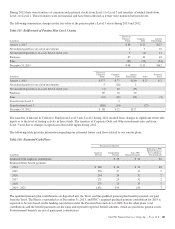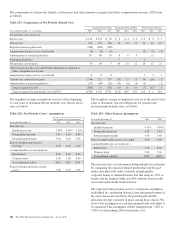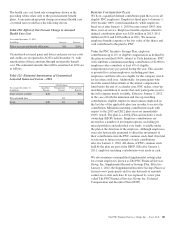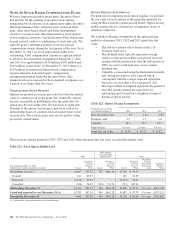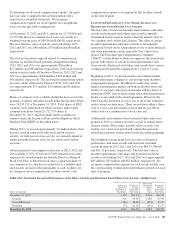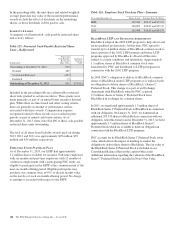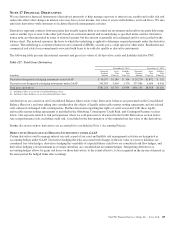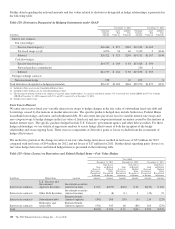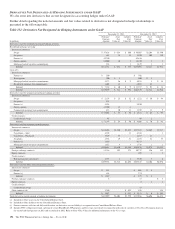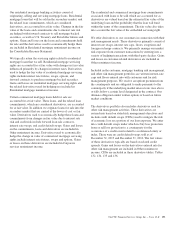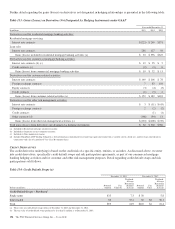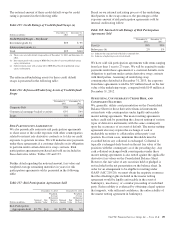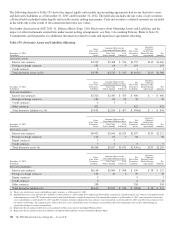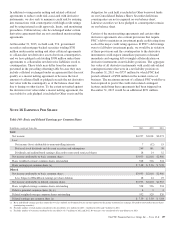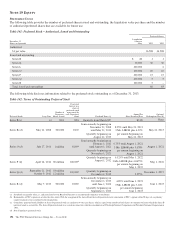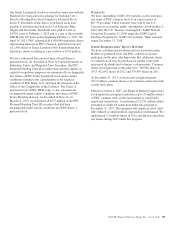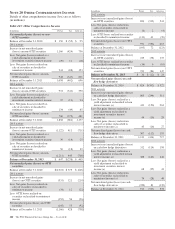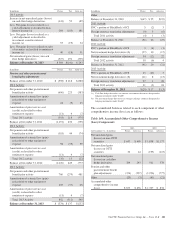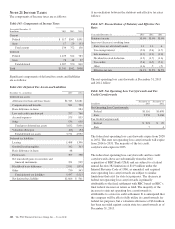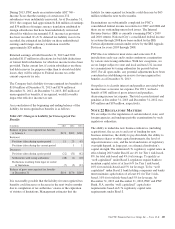PNC Bank 2013 Annual Report Download - page 211
Download and view the complete annual report
Please find page 211 of the 2013 PNC Bank annual report below. You can navigate through the pages in the report by either clicking on the pages listed below, or by using the keyword search tool below to find specific information within the annual report.Our residential mortgage banking activities consist of
originating, selling and servicing mortgage loans. Residential
mortgage loans that will be sold in the secondary market, and
the related loan commitments, which are considered
derivatives, are accounted for at fair value. Changes in the fair
value of the loans and commitments due to interest rate risk
are hedged with forward contracts to sell mortgage-backed
securities, as well as U.S. Treasury and Eurodollar futures and
options. Gains and losses on the loans and commitments held
for sale and the derivatives used to economically hedge them
are included in Residential mortgage noninterest income on
the Consolidated Income Statement.
We typically retain the servicing rights related to residential
mortgage loans that we sell. Residential mortgage servicing
rights are accounted for at fair value with changes in fair value
influenced primarily by changes in interest rates. Derivatives
used to hedge the fair value of residential mortgage servicing
rights include interest rate futures, swaps, options, and
forward contracts to purchase mortgage-backed securities.
Gains and losses on residential mortgage servicing rights and
the related derivatives used for hedging are included in
Residential mortgage noninterest income.
Certain commercial mortgage loans held for sale are
accounted for at fair value. These loans, and the related loan
commitments, which are considered derivatives, are accounted
for at fair value. In addition we originate loans for sale into the
secondary market that are carried at the lower of cost or fair
value. Derivatives used to economically hedge these loans and
commitments from changes in fair value due to interest rate
risk and credit risk include forward loan sale contracts,
interest rate swaps, and credit default swaps. Gains and losses
on the commitments, loans and derivatives are included in
Other noninterest income. Derivatives used to economically
hedge the change in value of commercial mortgage servicing
rights include interest rate futures, swaps and options. Gains
or losses on these derivatives are included in Corporate
services noninterest income.
The residential and commercial mortgage loan commitments
associated with loans to be sold which are accounted for as
derivatives are valued based on the estimated fair value of the
underlying loan and the probability that the loan will fund
within the terms of the commitment. The fair value also takes
into account the fair value of the embedded servicing right.
We offer derivatives to our customers in connection with their
risk management needs. These derivatives primarily consist of
interest rate swaps, interest rate caps, floors, swaptions and
foreign exchange contracts. We primarily manage our market
risk exposure from customer transactions by entering into a
variety of hedging transactions with third-party dealers. Gains
and losses on customer-related derivatives are included in
Other noninterest income.
Included in the customer, mortgage banking risk management,
and other risk management portfolios are written interest-rate
caps and floors entered into with customers and for risk
management purposes. We receive an upfront premium from
the counterparty and are obligated to make payments to the
counterparty if the underlying market interest rate rises above
or falls below a certain level designated in the contract. Our
ultimate obligation under written options is based on future
market conditions.
The derivatives portfolio also includes derivatives used for
other risk management activities. These derivatives are
entered into based on stated risk management objectives and
include credit default swaps (CDSs) used to mitigate the risk
of economic loss on a portion of our loan exposure. We enter
into credit default swaps under which we buy loss protection
from or sell loss protection to a counterparty for the
occurrence of a credit event related to a referenced entity or
index. There were no credit default swaps sold as of
December 31, 2013 and December 31, 2012. The fair values
of these derivatives typically are based on related credit
spreads. Gains and losses on the derivatives entered into for
other risk management are included in Other noninterest
income. CDSs are included in these derivative tables: Tables
132, 134, 135 and 136.
The PNC Financial Services Group, Inc. – Form 10-K 193


